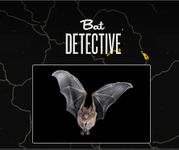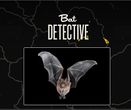Bat detective: Difference between revisions
Jump to navigation
Jump to search
No edit summary |
mNo edit summary |
||
| (2 intermediate revisions by one other user not shown) | |||
| Line 10: | Line 10: | ||
|field_cs_subject_areas=nature/conservation | |field_cs_subject_areas=nature/conservation | ||
|field_fields_of_science=zoology | |field_fields_of_science=zoology | ||
|field_project_description=Bat Detective is an Zooniverse citizen science project which asks the public to turn detective to find bat calls in audio recordings across the world | |field_project_description=Bat Detective is an Zooniverse citizen science project which asks the public to turn detective to find bat calls in audio recordings across the world | ||
|field_purpose_of_project=Mapping out bat ‘hotspots’ by using recordings and classifying the sounds they make for echolocation and social purposes. | |field_purpose_of_project=Mapping out bat ‘hotspots’ by using recordings and classifying the sounds they make for echolocation and social purposes. | ||
|field_research_questions=Calls that bats use for socialising are not used for echolocation but communication, and these calls tend to be lower in frequency and have a more complex structure. Only under a third of all the echolocation calls of bats worldwide are known and even less is understood about social calls. Perhaps only 5% of all species social calls have been recorded. | |field_research_questions=Calls that bats use for socialising are not used for echolocation but communication, and these calls tend to be lower in frequency and have a more complex structure. Only under a third of all the echolocation calls of bats worldwide are known and even less is understood about social calls. Perhaps only 5% of all species social calls have been recorded. | ||
| Line 20: | Line 20: | ||
|field_contact_person_URLs=https://twitter.com/batdetect | |field_contact_person_URLs=https://twitter.com/batdetect | ||
|field_team_location=University College London | |field_team_location=University College London | ||
|field_participant_task_description=Participants are required to differentiate between a bat and a non-bat call, the different types of calls and what sequence a call belongs in. | |field_participant_task_description=Participants are required to differentiate between a bat and a non-bat call, the different types of calls and what sequence a call belongs in. | ||
|field_Haklay_typology=crowdsourcing | |field_Haklay_typology=crowdsourcing | ||
|field_volonteer_computing=no | |field_volonteer_computing=no | ||
| Line 45: | Line 45: | ||
|field_socialsoftware_sites=Twitter, Facebook, other | |field_socialsoftware_sites=Twitter, Facebook, other | ||
|field_event_types=other | |field_event_types=other | ||
|field_events_frequency= | |field_events_frequency=5 | ||
|field_community_management=Blog contains most of the news/community updates. There was a google hangout with the bat detective team on 20/12/2013. Although there is some community participation in the comments, the blog is rather quiet(the last post was made on 7/2/2013). The twitter feed (@batdetect) is more active, as is the facebook page (https://www.facebook.com/batdetective). | |field_community_management=Blog contains most of the news/community updates. There was a google hangout with the bat detective team on 20/12/2013. Although there is some community participation in the comments, the blog is rather quiet(the last post was made on 7/2/2013). The twitter feed (@batdetect) is more active, as is the facebook page (https://www.facebook.com/batdetective). | ||
|field_community_interaction_forms= | |field_community_interaction_forms=Twitter and http://talk.batdetective.org/ | ||
|field_team_work=N/A | |field_team_work=N/A | ||
|field_community_awareness_tools= | |field_community_awareness_tools=Various science blogs and an appearance on BBC news | ||
|field_completion_level=High | |field_completion_level=High | ||
|field_last_edition=2013/12/09 | |field_last_edition=2013/12/09 | ||
}} | }} | ||
{{Free text}} | {{Free text}} | ||
The signup/login process is not working as of 9/12/2013 on firefox, chrome or safari. The project does not look particularly active at the moment. | |||
{{bibliography | {{bibliography | ||
|field_author=Bat detective team | |field_author=Bat detective team | ||
Latest revision as of 17:43, 12 September 2018
| BIBLIOGRAPHY |
The signup/login process is not working as of 9/12/2013 on firefox, chrome or safari. The project does not look particularly active at the moment.



